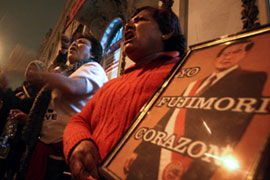Fujimori extradited from Chile
Peru’s former president leaves Santiago to face human rights and corruption charges.

“This does not mean that I’ve been tried, much less convicted. … I hope that in Peru there exists the due process to clarify the accusations against me,” he told the Chilean newspaper El Mercurio on Saturday.
Embezzlement charges
| Profile |
Lima has accused Fujimori of responsibility for atrocities carried out by the army’s Colina Group squadron, including the massacre in 1992 by state forces of nine students at La Cantuta University, and the killing of 15 people in an area of Lima in 1991.
But while acknowledging “gross failures” in office, Fujimori told Peru’s RPP radio: “In the trials themselves, I will show that I acted in a correct manner.”
Fujimori’s daughter, Keiko, a Peruvian congresswoman, called on supporters to show up at the airport in Lima to give him a warm welcome on his return.
“I call on Fujimoristas to mobilise … we will demonstrate that he is innocent of the charges,” she said at a news conference.
‘Fair trial’
Peru has welcomed the court’s ruling and pledged a fair trial and dignified treatment for the former president during his detention.
“Democracy will demonstrate it is morally superior to the dictatorship once the case gets under way,” Jorge de Castillo, Peruvian prime minister said on Saturday.
 |
| Peruvians remain divided over the former president’s legacy [AFP] |
“This is the first time that a court has ordered the extradition of a former head of state to be tried for gross human rights violations in his home country,” the organisation said in a statement.
“After years of evading justice, Fujimori will finally have to respond to the charges and evidence against him in the country he used to run like a mafia boss,” Jose Miguel Vivanco, HRW’s Americas director, said.
Fujimori was born to Japanese parents and, after fleeing Peru in 2000, he spent five years in Japan where he later resigned as president via a fax message.
A former academic, he became president in 1990, defeating Mario Vargas Llosa, the renowned writer.
Japan confirmed Fujimori’s citizenship and consistently refused extradition requests from Lima before he flew unannounced to Chile in 2005 to launch another bid for Peru’s presidency.
While under house arrest in Santiago, Fujimori even made an unsuccessful attempt to be elected to Japan’s parliament, a candidacy that critics in Peru saw as another bid to avoid prosecution.
